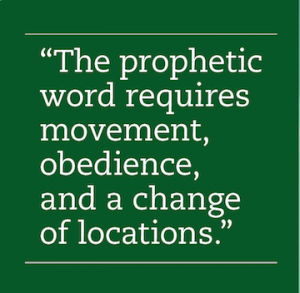Publication: One-to-One, Summer 2012
 Early in my ministry, I spent a lot of time studying and preaching on prophecy. Lately, I have been called back to the subject by the Holy Spirit. I am more convinced than ever that the fulfillment of prophecy is the most powerful authentication of the Bible as God’s Word.
Early in my ministry, I spent a lot of time studying and preaching on prophecy. Lately, I have been called back to the subject by the Holy Spirit. I am more convinced than ever that the fulfillment of prophecy is the most powerful authentication of the Bible as God’s Word.
The words spoken by God not only created and sustained all that is, but creation is on a prophetic path to fulfill all that was spoken, and we do well to study the Word of God regarding the prophetic journey that we are on. The Word of God gives us both promises and warnings regarding our choices as we sojourn. Obedience will lead us to the Land of Promise. (See Acts 3:18- 26; romans 1:1-6; Luke 1:70.)
Satan’s first appearance in creation was to question the Word of God. The warnings given by God came to pass. The very existence of evil testifies to God’s Word. If we know and heed His promises, our journey will take us to the tree of life, the river of life, and the very throne of God (see revelation 22). But it is a journey, and as we study Abraham and Israel, we can better understand our journey and what God has called us to do.
ABRAHAM
Abraham was chosen by God to be the “father of the faith”, and he demonstrated numerous lessons from which we can benefit (study Romans 4). The Lord promised Abraham a son, a land, a nation; God promised that he would bless all nations and have great name. At the time, Abraham had none of that. In the ensuing centuries, those words are still coming to pass—4000 years later!

In Genesis 15:13, the Lord told Abraham his descendants would be strangers and servants in a foreign land for 400 years, and then they would be led out. This too came to pass, as God chose Moses to continue the prophesied journey (see Exodus 3).
We must note here that Abraham sinned in the matter of Hagar, the bond woman. Hagar gave birth to Ishmael. Abraham had waited, but his wife Sarah had no son, so he attempted to fulfill the Word of God his own way. But Ishmael was not the son of promise given to Abraham and Sarah. God fulfills His own Word, His own way, and in His own time. Though Abraham sinned, he was justified by faith, and that is good news for us.
MOSES
Moses, like Abraham, was not perfect. He had murdered an Egyptian who was abusing an Israelite slave, then escaped east to Midian. Forty years later, God called Moses at the burning bush to deliver Israel from slavery to the land promised to Abraham. God introduced Himself to Moses as “the God of Abraham, Isaac, and Jacob”, the three grandfathers to whom God had made and confirmed His covenant. Again, the Word required a journey for both Moses and Israel.
The story of Israel’s deliverance from Egyptian slavery is a remarkable example of our deliverance from the culture of “slavery to the flesh”.
Deliverance requires:
• A call to a preacher of the Word
• A struggle between powers
• The shedding of blood
• The eating of a covenant meal and baptism in water and Spirit.
They were instructed to dress for a journey. All of this, however, was just the beginning, not the end.
Israel had barely crossed the red Sea until they were testing God with grumbling, doubt, looking back, and outright rebellion. They even reverted to idolatry. So, they wandered for 40 years before a new generation would resume the prophetic journey to enter the Land of Promises (study Psalm 105).
THE AMALEKITES
The Amalekites are an amazing story. They were descendants of Esau, who was the oldest son of Isaac. Esau despised his spiritual inheritance, and became bitter at his brother Jacob, who not only wanted it but got it through deception (Genesis 27-28; Hebrews 12:14-17). The bitterness of Esau was passed on to his descendants who continued to despise Israel, the descendants of Jacob.
So, when Jacob’s descendants— Israel—began the journey to their inheritance (the one promised to Abraham, Isaac, and Jacob) guess who was first to attack them? The Amalekites! The Amalekites remind us that there are adversaries to God’s prophetic purpose who will not sit passively while we sojourn.
Evil is a malignant force that we can defeat if we recall and declare prophetic purpose. The Lord is the “Lord of Battles” and will guide us to victory—because He watches over His Word to perform it. It is not simply that He prefers us to our enemies; He is no respecter of persons. It is because He has determined His will, and if we walk in it, it shall be accomplished.
Having said that, there will be instructions to obey. In this battle, the Lord told Moses to go upon a hill overlooking the battle, and take two men with him, Aaron and Hur. The Lord also instructed that Joshua should lead the battle.
Moses was instructed to hold up his staff, and as long as he did, Joshua prevailed over the Amalekites. But when his arm grew weary, and he allowed the staff to drop down, Amalek prevailed. So, Aaron and Hur held up his hands and seated Moses on a rock the rest of the day until evening, and Israel defeated the Amalekites.
There are numerous lessons here for us to observe:
• Listen for guidance when you are in battle
• Leaders need a strong core of support
• Leaders get weary and bad things happen
• Lifting up the leaders hands helps us all win (see Isaiah 35:3-4).
• Authority is best exercised while seated upon the rock with strong supporters on either side.
There are other lessons here, but we should observe a prophetic word that the Lord gave to Moses after the victory: “I will have war with Amalek from generation to generation.” Bear in mind that the Amalekites were descendants of Esau, the bitter one. And, as the prophecy said, they kept turning up in history in an effort to defy the Word of the Lord.
The war was not only a war between Israel and the Amalekites; it was a war against the prophetic Word of God, a war to prevent His people from completing their journey. The battles are incidental; the journey is everything! Genesis 12, exodus 17, Psalm 83, and all the words of the prophets are yet with us and will be fulfilled (see Acts 3:21). We need to know and declare those words!
One of the classic debates in history and the present is the debate between God’s Sovereign will and man’s free will. Both are realities, but how these two wills interact is crucial. There is a fork in our path. We can choose our will or we can choose His. History is filled with consequences of either choice.
Esau and Amalek chose their own way; Abraham, Moses, and others sought and discovered God’s prophetic purpose. They took the path to His prophetic promises and began the journey (see Proverbs 14:12; Isaiah 53:6). Psalm 23 gives us a clear picture of the “path of the righteous.” And it tells us where that path leads. But those who choose their own way choose peril over promise.
While we may be born again by faith in Jesus Christ and the regenerating power of the Holy Spirit, we are faced with choices daily—our way or His. These choices have consequences, even if we are forgiven. Wrong choices and detours can be painful.
OUR JOURNEY
All kinds of leaders would do well to study the prophets (see 2 Timothy 3:15-16). Attempting to get the “land of promise” without God’s guidance is futile. A study of Nietzsche, Marx, or Hitler, and a host of others should be ample evidence that to ignore God and pursue some Utopian or atheistic philosophy is indeed foolish.
But what about you and me? Is it not equally foolish to simply go to church and participate in its good programs, yet ignore His Divine purpose for our lives? Yes, it is. Religion is no substitute for obedience and becoming a sojourner in the plan God has for our lives (see 1 Samuel 15:22).
My challenge to you is simply this: study the prophets and apostles to discover God’s eternal purpose, then seek the Lord for your calling and begin the journey. There is a land of promise for all of us, and we need not perish in some wilderness, coming short of the great possibilities.
Why not gather a small group of friends around the question: where are we going and can we help each other get there? Godspeed as you travel together in faith.
Scripture Reference: Acts 3:18-26; Romans 1:1-6; Luke 1:70; Revelation 22; Romans 4; Romans 14:17; Genesis 15:13; Exodus 3; Psalm 105; Genesis 27-28; Hebrews 12:14-17; Isaiah 35:3-4; Genesis 12; Exodus 17; Psalm 83; Acts 3:21; Proverbs 14:12; Isaiah 53:6; Psalm 23; 2 Timothy 3:15-16; 1 Samuel 15:22
Charles Simpson is an internationally-known author, Bible teacher, and pastor, serving in ministry since 1955. He is also Editor-in-Chief of One-to-One Magazine and ministers extensively throughout the United States and the nations.